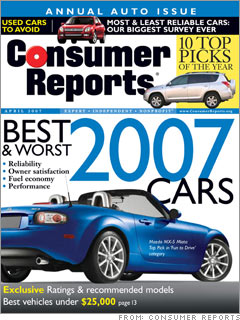The biggest problem is that fewer American cars even make it into consideration. To be a "Top Pick," a vehicle must first earn Consumer Reports' general recommendation. That doesn't mean it's the best, but it's at least proven to be reliable, safe, it handles well and is reasonably easy to live with.
Of 23 Toyotas tested by Consumer Reports since 2000, 20 are recommended. Of 37 General Motors cars tested, only 13 are recommended. For Ford, it's eight out of 17 and, for Chrysler, four out of 20.
Besides reliability, American cars can fall down in other areas. Ford, for example, tends to do well in ride and handling, but poorly in braking performance and fuel economy, according to Consumer Reports. While GM has improved greatly in the "fit and finish" of its cars, there still tend to be problems with emergency handling and fuel economy, Consumer Reports says.
Chrysler has the second-lowest score of any automaker in Consumer Reports testing. Bad visibility, cheap interiors and noisy engines are cited as specific problems.
Things are getting better, though. New models and recently redesigned cars from Ford and GM are much more reliable and getting better test scores. The Ford Focus and Buick Lucerne, while not top-rated, are cited as two very good cars that signal a potential turnaround for Detroit products.
And in case you think Consumer Reports always likes Japanese car companies, there is one company with lower average scores than Chrysler: Suzuki.

